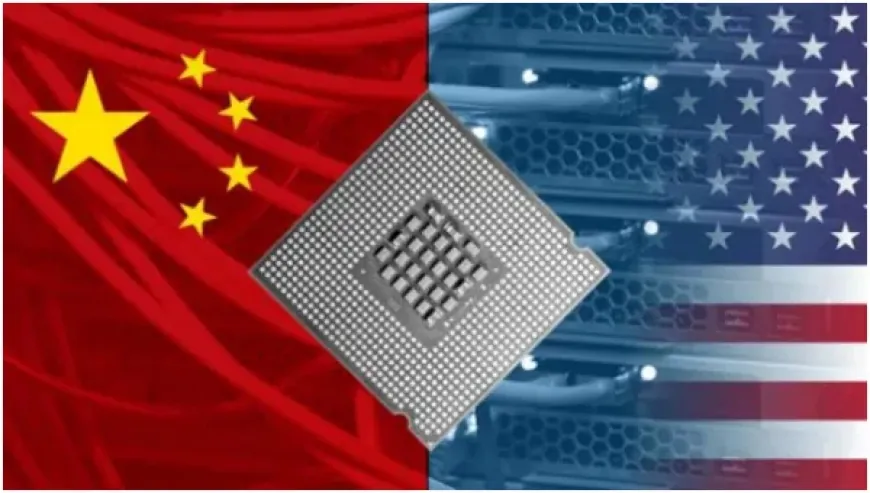U.S. Blocks Intel, Samsung & SK Hynix from Producing Chips in China with American Equipment
The U.S. revokes permissions for Intel, Samsung, and SK Hynix to produce chips in China using American semiconductor equipment, affecting production operations.

Washington, D.C. — The U.S. government has intensified its restrictions on semiconductor manufacturing in China by revoking permissions for major chipmakers—Intel, Samsung, and SK Hynix—to use American-made semiconductor equipment in their Chinese facilities. This action, announced in the Federal Register, alters previous exceptions granted in 2022 that allowed these companies to operate in China despite broader export controls.
Under the new policy, these companies will now be required to obtain individual licenses to acquire American semiconductor manufacturing equipment for their operations in China. This shift is expected to impact U.S. equipment suppliers, including KLA Corp, Lam Research, and Applied Materials, by reducing their sales in the Chinese market. Conversely, domestic Chinese equipment manufacturers may benefit from the change, as they could fill the gaps left by restricted U.S. exports.
The policy change is also anticipated to affect competition in the memory chip sector. U.S.-based Micron, a significant competitor to South Korea's Samsung and SK Hynix, may gain an advantage as the restrictions limit the ability of these companies to produce memory chips in China.
Intel had previously sold its Dalian NAND memory manufacturing facility in China to SK Hynix but continued wafer production through 2025. The new restrictions will apply to any remaining operations involving American-made semiconductor equipment.
KLA, Lam, and Applied Materials Likely to See China Sales Decline
U.S. companies that sell semiconductor manufacturing tools to China are likely to see direct impacts. KLA Corp, Lam Research, and Applied Materials, which previously supplied key equipment to Intel, Samsung, and SK Hynix facilities in China, may face a decline in sales once the new licensing requirements take effect in 120 days. Analysts note that this could reduce revenues in the short term and prompt these firms to adjust production schedules or seek alternative markets.
At the same time, Chinese equipment manufacturers may see an increase in demand. Companies such as SMIC-affiliated tool makers could capture orders that previously relied on American technology, partially offsetting domestic production challenges.
South Korean Memory Production Impacted
The U.S. restrictions could reshape competition in the memory chip industry. South Korea’s Samsung and SK Hynix, which rely on advanced U.S. equipment for certain wafer fabrication processes, may face slower production or higher costs in China. Micron, the U.S.-based memory chip producer, could benefit indirectly, as its competitors’ operations encounter bottlenecks.
Intel’s previous sale of its Dalian NAND facility to SK Hynix means the impact is limited to ongoing wafer production under U.S.-equipment use. Analysts anticipate that any delays or capacity reductions will be closely monitored by investors and could affect memory chip prices globally.
China Increases Domestic Chip Output
Chinese firms and government bodies are responding to the restrictions by investing in local semiconductor capacity:
-
The National Integrated Circuit Industry Investment Fund continues to support domestic chipmakers in scaling production.
-
Companies like Cambricon and Huawei are focusing on AI chip design, aiming to reduce reliance on foreign equipment.
-
SMIC and other foundries are accelerating projects that substitute domestic tools for restricted U.S. equipment, particularly in advanced logic and memory fabrication.
The U.S. Commerce Department’s restrictions are expected to directly affect global chip production. Samsung and SK Hynix will face slower memory chip output in China, while Intel’s remaining wafer operations must comply with new licensing requirements. U.S. equipment suppliers such as KLA Corp, Lam Research, and Applied Materials may see reduced orders, while Chinese manufacturers like SMIC could gain additional business. These changes are likely to impact global electronics supply chains, including smartphones, PCs, and servers, as companies adjust production and sourcing to meet demand under the new rules.
Also Read: Nvidia Designing New AI Chip for China Under U.S. Export Rules
































































